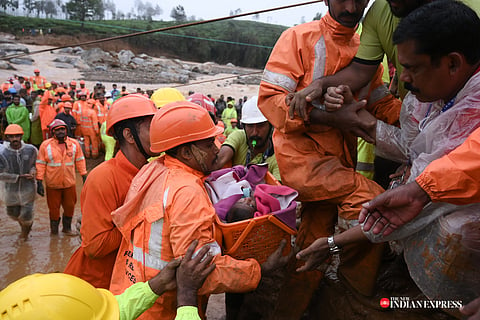

NEW DELHI: The catastrophic landslides in Kerala’s Wayanad on July 30 were caused by climate change, says a new analysis by World Weather Attribution (WWA). It says the shift in weather patterns, caused by human activities, triggered a 10% heavier rainfall burst in the region, which in turn resulted in the landslips.
To mitigate the impact of such natural calamities in future, the WWA—an international collaboration of climate scientists who conduct rapid assessments of extreme weather events—recommends minimising deforestation and quarrying along with improvement of early warning and evacuation systems. The study also recommends replacing fossil fuels with renewable sources of energy to reduce the one-day burst rainfall-like conditions.
The study ‘Landslide-triggering rainfall made more intense by human-induced climate change, devastating highly vulnerable communities in northern Kerala’ was done by a group of climate scientists, researchers and institutions associated with WWA.
It notes that the region witnessed 146 mm of rainfall in a single day, which is the third heaviest on record in Kerala.
Vulnerable district
The soils in the hilly Wayanad district are among the loosest and most erodible in Kerala, with high risk of landslides during the monsoon season. The researchers say that construction in hillside areas, deforestation, and quarrying must be curbed to avoid similar disasters in the future
‘Don’t use fossil fuels’
“If the world does not move away from fossil fuels, one-day spells of rainfall in Kerala will become a further 4% heavier, risking even more destructive landslides,” says Mariam Zachariah, researcher, Grantham Institute - Climate Change and the Environment, Imperial College London